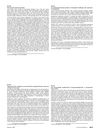TLDR Methotrexate improved skin condition in 64% of patients with generalized granuloma annulare.
The study evaluated the efficacy and adverse effects of methotrexate in treating generalized granuloma annulare (GGA) through a retrospective case series of 11 patients. Results showed that 64% of patients experienced improvement, with 43% achieving complete clearance and 57% partial clearance. Methotrexate doses ranged from 12.5 to 15 mg weekly, administered orally or subcutaneously. Most patients tolerated the treatment well, though 18% experienced adverse effects such as gastrointestinal upset or hair loss. Despite the lack of a control group and precise measurement tools, the study concluded that methotrexate could be a successful and well-tolerated treatment option for GGA.
 77 citations
,
July 2007 in “Dermatologic Therapy”
77 citations
,
July 2007 in “Dermatologic Therapy” Methotrexate is a key, cost-effective drug for skin conditions, but requires careful monitoring for side effects.
 July 2018 in “Elsevier eBooks”
July 2018 in “Elsevier eBooks” Scalp psoriasis can cause different types of hair loss, with some patients developing permanent hair loss, and treatment may be stopped due to skin reactions.
 November 2019 in “Harper's Textbook of Pediatric Dermatology”
November 2019 in “Harper's Textbook of Pediatric Dermatology” The document is a detailed medical reference on skin and genetic disorders.
 7 citations
,
January 2011 in “Journal of The American Academy of Dermatology”
7 citations
,
January 2011 in “Journal of The American Academy of Dermatology” Most women with hyperandrogenism first show acne, and skin conditions like hirsutism and acanthosis nigricans are good indicators of the condition.
 1 citations
,
September 2022 in “Nepal journal of dermatology, venereology & leprology”
1 citations
,
September 2022 in “Nepal journal of dermatology, venereology & leprology” Apremilast shows promise for several skin conditions but needs more research.
 22 citations
,
October 2020 in “Anais Brasileiros de Dermatologia”
22 citations
,
October 2020 in “Anais Brasileiros de Dermatologia” The Brazilian Society of Dermatology agrees that oral isotretinoin is effective for acne and other skin conditions, and it's safe when monitored, but more research is needed on dosing and duration.






